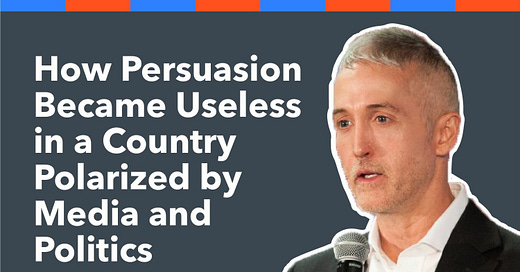Trey Gowdy is a former federal prosecutor and Congressman from Greenville, South Carolina. Known for his ability to persuade, question, and debate in courtrooms and Congressional hearings, Mr. Gowdy rose to fame within the Repubican Party. He resigned in 2018 when he could no longer tolerate the hyper-partisanship and polarization of political discourse. In this interview, Mr. Gowdy discusses the state of America’s political discourse, how both constituents and politicians should be blamed for fueling polarization, social media’s outsized role in shaping people’s beliefs, and his optimism and pessimism for this election season and beyond. Mr. Gowdy had a stellar career as a prosecutor, achieving the highest performance rating possible for a federal prosecutor two years in a row. His recently published book, "Doesn’t Hurt to Ask: Using the Power of Questions to Communicate, Connect, and Persuade," provides guidance to those who wish to become effective communicators. Mr. Gowdy talks about how politicians make up their minds before a hearing or debate even begins, making the art of persuasion pointless. How does this book relate to partisan politics or the current polarizing political environment? How can people from both sides find better ways to communicate with and convince each other? We seem to live in an era where people can always find supporting facts for any of their beliefs. Mr. Gowdy reflects on his years as an attorney and explains what makes good facts. The mere existence of a fact doesn’t make it good per se and shouldn’t be sufficient in immediately convincing the voters. Important topics such as healthcare shouldn’t be reduced to 2-minute answers in presidential debates, nor should people rely on 140-character tweets for their opinion on science and politics. What concrete steps can we take to encourage long-form, open-minded dialogues between friends, neighbors, and politicians? Considering how successful some one-liners are in “riling up the base” – such as many simply label progressives as “communists” or conservatives as “racists” – can we really pin the blame for polarization on the language used? Could there be more fundamental reasons for this polarization that created a political environment where such rhetoric proved more politically beneficial than genuine debate and argumentation? How much can we blame the politicians versus the voters themselves? We also dive into some more fundamental normative questions: What is the role of government? Does the American legislative branch require foundational reforms in order to break through partisanship? If we end up entering a contested presidential election on November 4th, why is the Supreme Court unable to be seen as an independent, trustworthy institution that could help provide clarity? Mr. Gowdy and Tiger might disagree on a number of issues, but they both believe in the power of genuine dialogue and feel passionate about creating healthy political discourse in their lives – whether it’s on Policy Punchline and The Trey Gowdy Podcast, or through writings such as "Unified: How Our Unlikely Friendship Gives Us Hope for a Divided Country." We hope this interview could open up an opportunity for you to reflect on some of these matters and spark some discussions with those around you.
1×
0:00
Current time: 0:00 / Total time: -46:32
-46:32
Trey Gowdy: How Persuasion Became Useless in a Country Polarized by Media and Politics
Oct 26, 2020














Share this post